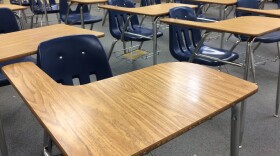When it comes to reducing the number of high school dropouts, Colorado appears to be making progress. According to the Colorado Department of Education, the current rate for the 2013-2014 school year is 2.4 percent – a substantial improvement from 2005-2006 when it was 4.5 percent.
Even that kind of improvement isn’t enough for education advocate Steve Dobo. He’d like to see the number of dropouts reach zero. He’s so committed to the idea, he incorporated it into his company name, Zero Dropouts.
But is a goal like that even possible?
"Absolutely. There are many districts across the state of Colorado that actually have zero dropouts," Dobo said. "They’re usually small, rural districts that are able to do that, but I think the practices of relationship and being able to watch every student and make sure they stay on track is what the rural districts are able to do with smaller numbers."
In 2005, Dobo founded the group Colorado Youth for a Change, which focuses on dropout prevention and on re-engaging students who have dropped out to complete their high school education. As the founder and CEO of Zero Dropouts, he works in Colorado and other states to change the conversation about why students drop out – and how to get them back.
"I’ve stopped calling it a 'dropout' problem, and started calling it a 'dropout system' problem," Dobo said. "I don’t believe it’s about the personal deficiencies of our young people. It’s more that we’ve created a system that does not work for all kids."
The traditional school model may have worked for nearly all students in the past. But Dobo says many of today’s high school students have complex lives. They may have to work to care for family members -- sometimes their own children; or they may be homeless, in the foster care system, or have substance-abuse problems.
To keep more of these students in school, Dobo said districts need to offer different, flexible options. These may include night programs, Saturday programs, and summer school offerings.

"What we find is special education actually has it right – that every student needs an individual learning plan… an education plan that’s customized for the individual," Dobo said. "What we need [too] are school districts that understand that, and understand the special circumstances and the need for special programs for all students."
Interview Highlights
What Does A Successful Program Look Like?
"When we started looking at how migrant and transient, homeless students could be successful, we found from the research three key characteristics. One is that a school needs to have a welcoming culture – when a student comes in there they need to feel like they’re a part of that school. Second is that we need flexible programs – so we need morning programs, night programs, Saturday programs, summer school programs, that meet the various schedules of these students. And, we need easy access. When there’s barriers to enrollment, these kids are the first ones to not get in, so we need easy access to those programs."
How Can Different Programs Be Modeled?
"We look at data around students that have dropped out from the district. And then we look at the students that are not earning credit enough to graduate on time. That’s a pool of students that you could argue are not being served well from the current programs of the district. And then I say, 'Here’s 300 kids that you have nothing for. What do we want to create to serve the needs of that student?'
It’s really looking at research and data and saying, 'Let’s create a portfolio of school options.' A traditional school option might work for 30 percent of kids, but for those other 70 – what is the particular program that’s going to work? And just continually stay at it. Eventually… you have an option for every type of kid that’s going to come your direction – because you’ve looked at the students that you’re dealing with."






